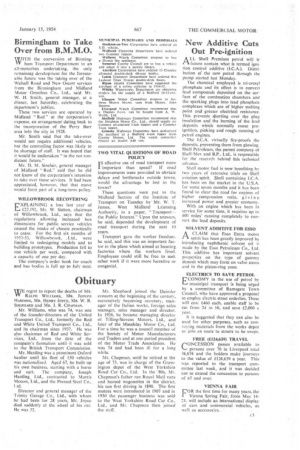Birmingham to Take Over from B.M.M.O.
Page 41

If you've noticed an error in this article please click here to report it so we can fix it.
WIThaHm tThreancsopnovrterDsioepnarotmf eaBtirlmoinaga
all-motorbus undertaking, the only remaining development for the foreseeable future was the taking over of the Walsall Road and New Oscott services from the Birmingham and Midland Motor Omnibus Co.. Ltd., said Mr. W. H. Smith, general manager, at a dinner, last Saturday, celebrating the department's jubilee.
These two services are operated by Midland "Red at the corporation's expense, an arrangement 'dating back to the incorporation of the 'Perry Barr area into the city in 1928.
Mr. Smith said that the take-over would not require additional vehicles, but the controlling factor was likely to be shortage of.staff. It was hoped that it would be undertaken "in the not-toodistant future."
Mr. D. M. Sinclair, general manager of Midland "Red," said that he did not know of the corporation's intention to take over those services. It had been appreciated, however, that that move would form part of a long-term policy.
WILLOWBROOK RECOVERING EIXPLAINING a loss last year of £22.192, Mr. W. Sutton, chairman of Willowbrook, Ltd., says that the regulations allowing increased box dimensions for public service vehicles caused the intake of chassis practically to cease. For the first six months of 1952-53, .Willowbrook, . Ltd., were limited to redesigning models and to building prototypes. Production fell to one vehicle per week, compared with a capacity of one per day.
The company's order book for coach and bus bodies is full up to July next. TWO VITAL QUESTIONS OF ROAD POLICY
IS effective use of road transport more l'important than speed? If road improvements were provided to obviate delays and bottlenecks outside towns, would the advantage be lost in the towns?
These questions were put to the Midland Section of the Institute of Transport on Tuesday by Mr. W. T. James, West Midland Licensing Authority, in a paper, "Transport— the Public Interest." Upon the answers, he said, depended the development of road transport during the next 10 years.
Transport gave the worker freedom. he said, and this was an important factor in the plans which aimed at locating factories where the workers lived. Employees could still be free to seek other work if it were more lucrative or congenial.




































































































